Stacey Abrams Is Just Getting Started
The controversial Georgia governor’s race spurred Democratic nominee Stacey Abrams to file a federal lawsuit calling for election reform. Scathed but unbroken, she has emerged as the future of the party—delivering the Democrats’ response to the State of the Union—with ever-growing calls that she seek the highest office in the land.
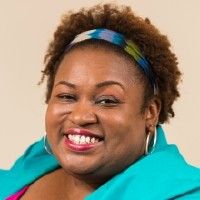

Asymptotic. This is the word Stacey Abrams chooses to describe her phenomenal rise as an overachieving black woman from a “genteel poor” family in the Deep South. For someone who had considered physics as a major, it is a term that perfectly captures how the Georgia governorship and other major accomplishments (she was a finalist for the Rhodes Scholarship too) have, despite valiant effort and a singularly impressive résumé, eluded her. “I call it my asymptote of success,” she tells me, while I wonder what such a word could possibly mean. “An asymptote,” she explains as if she were the coolest college professor ever, “is a curve that comes close to the line. It’s infinitesimally close but never actually crosses the line. That’s sometimes how I feel my life has gone—that I come incredibly close to these things, but that barrier has yet to be crossed. I have understood for a long time that my trajectory was always going to be asymptotic, but my mission is to break the plane.”
The scientific way that Abrams, 45, parses her life’s path is indicative of how she ran the governor’s race. By all measures, the former Georgia House minority leader’s run for the Georgia governorship as the first African American female nominee by a major party was historic. More than 1.2 million African Americans voted in the race, exceeding the total number of Democratic Georgia voters in 2014. Abrams got more votes than Barack Obama (who campaigned for Abrams, as did Oprah Winfrey) and Hillary Clinton did during their respective presidential campaigns in the Peach State. Even more impressive is that she received this number of votes in a midterm-election year. Her campaign tripled voter turnout among Latino and Asian American voters. White voters supported Abrams more than any recent candidate in history. And she received more votes from white women than Hillary Clinton did. But in the end, the official result: Republican opponent Brian Kemp had 1,978,408 votes (50.2 percent) and Abrams had 1,923,685 (48.8 percent)—a difference of 54,723 votes. (No majority would have triggered a runoff.)
Abrams tells me with no hesitance, “If we had a fair fight, we’d have won that election.” It is a fact we can never truly know.
I have beliefs that are authentic and true to who I am. I am not going to disrespect [others’] beliefs by telling them theirs are wrong. I’m telling them I don’t agree and what I intend to do, which creates a space that we can actually talk about it without them defending who they are. We can instead argue about how we do it.
But the numbers don’t tell the full story. A serial trailblazer, Abrams is no mere politician. She is a political operative, trying to build the kind of political shop that can change southern politics, and therefore national politics, for generations to come. Too often, black women’s political genius hides in plain view. To overlook Abrams’s calculated political strategy is to miss—or ignore—that she is playing a very long game. She launched the New Georgia Project in 2013, submitting over 200,000 voter registrations in five years. She started the Blue Institute in 2015 to train a whole new class of black and Latino political operatives who would have the qualifications to run progressive campaigns such as hers throughout the country, focusing on southern states.
Abrams did not concede victory to Kemp. She did give an “acknowledgement” speech, recognizing that he would be sworn in as Georgia’s next governor. But she has already set her sights on a larger fight: ensuring access to fair elections in Georgia through her Fair Fight Action campaign. And certainly she has pledged to run for office again. But first, she has to get her voice back.
The morning after the November 6 election, Abrams slept late, watched Sorry to Bother You, an African American sci-fi comedy with dark overtones—“It was the wrong movie to watch,” she says, laughing—then got on the phone to secure additional donations for the battle ahead. After spending the rest of the day strategizing how exactly they would force the state of Georgia to count every vote, including provisional and absentee ballots, Abrams woke up on the 8th with acute viral pharyngitis (inflammation of the pharynx). That the grueling pace of the election coupled with the controversial returns had physically robbed Abrams of her actual voice is about as on the nose a metaphor as you can get for the ways the election worked to politically rob her supporters of their collective voice. Over the next four days, as she struggled to recover, her team fought, at her behest and direction, for a full tally of Georgia’s votes. “But,” she says, “we knew the numbers were gonna be hard. [Kemp] was an effective voter suppressor. What he had done over the course of 10 years we were not going to undo in 10 days.”
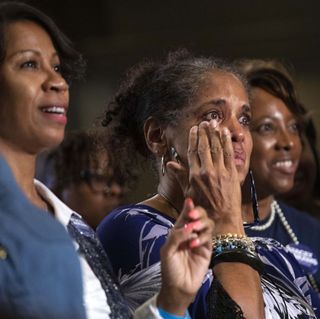
Supporters watching returns at Abrams’s election-night party at theHyatt Regency in Atlanta.
The sheer volume of stories and the levels of election chicanery are staggering. On election morning, Candi Dugas, a poll watcher in Atlanta, saw an older woman turned away from the polls.“They said she had already cast her ballot at a precinct that was too far away for her to have gone and then come to where we were,” Dugas says. Because the system had incorrectly marked that she had cast a ballot, “there was nothing they could do.” The woman left. Valerie Thomas, an Atlanta educator, was on heightened alert after receiving notification that she might be purged from Georgia’s voter rolls. Kemp put on hold the registrations of 53,000 voters—70 percent of whom are African American, according to an Associated Press report—based on a dubious 2017 law about signatures needing to be an “exact match.” (Kemp, who over his years as secretary of state, from 2010 to 2018, had been accused of voter suppression and sued by advocacy groups including the ACLU and the Georgia NAACP, said they were all eligible to vote on Election Day. He’s denied all allegations.) Thomas chose to vote early. In addition to long lines—four to five hours in many precincts—and low numbers of voting machines, the fewest she’d ever seen in her polling location, there were only three poll workers. When she finally made it into the booth, “the voting machine kept skipping,” she told me. “I kept having to hit it. When I went to the last screen to check, two of the candidates weren’t the candidates that I chose.” Georgia voter Donna Troka mailed in an absentee ballot weeks before the election. “As I got closer and closer to that date,” she recalls, “I started to panic because it wasn’t showing up as received” on the secretary of state’s website. Troka went to her local precinct to vote and was told her absentee ballot had been received. She simply had to trust the woman who told her that her vote would be counted. Cazembe Murphy Jackson, an activist in Atlanta, had been part of several community efforts to get out the vote. When he went to cast his ballot, his name was not on the list. Unsure of how provisional ballots worked, he refused the one offered to him. (Provisional ballots record votes when a voter’s eligibility is in question. The Abrams campaign had to fight to ensure these ballots were counted.) After driving 30 minutes across town, Jackson was able to vote, but he told me, “Thankfully, we had a car. I have a job that’s flexible and cares about civic engagement enough that they wouldn’t care about me having to take off.”
Stay In The Know
Marie Claire email subscribers get intel on fashion and beauty trends, hot-off-the-press celebrity news, and more. Sign up here.
More than 40,000 Georgians called a voter-protection hotline on Election Day and for 10 days after to report rampant election irregularities. Those complaints are the basis of the massive federal lawsuit filed by Fair Fight Action in late November. Lauren Groh-Wargo, CEO of Fair Fight Action and former manager for the Abrams campaign, says, “We filed the suit alleging constitutional violations of the right to vote in Georgia and that there was disparate and disproportionate impact onAfrican Americans and voters of color. We’re asking for full reform of the system.” This includes everything from addressing the use of “old, shoddy voting machines, to accepted use of provisional ballots, to the exact-match and registration issues, to local election officials’ training.” Abrams hopes that it will become part of the record of cases that compels the country to reinstitute the enforcement provisions of the Voting Rights Act of 1965, parts of which were overturned by the Supreme Court in 2013. “We have to remember the point of elections is to make policy,” she continues. “It is centered right now on voting rights, but those voting rights are directly tied to whether you have access to health care, Medicaid expansion, reproductive health. We are hoping that because of court decisions, the state legislature will decide to do things better.” As Fair Fight wends its way through federal courts, Groh-Wargo imagines that the state of Georgia’s “tactic will be to delay and not deal with this miscarriage of justice. We expect this to be a big fight.” Fair Fight’s stance will be “unrelenting,” she adds.
“Failure isn’t fatal,” Abrams tells me of her non victory in the governor’s race. But given the injustices faced by both Abrams and her voters, she has the right to some grief. When she had time to reflect on that 10-day period between Election Day and Non-Concession Day, she told her sister Jeanine, “You sat shiva with me for 10 days.” (Shiva is a Jewish ritual period of mourning for a loved one.) The daughter of Methodist ministers, Abrams demonstrates a willingness to draw sustenance from a range of spiritual traditions—just one more way that she shatters stereotypes of southern politicians as parochial and conservative. “It was 10 days of mourning, 10 days of anger at the gods, 10 days of grief, 10 days of righteous indignation.” But she refused to allow her grief, anger, and indignation to overtake her. “Part of my makeup as a black woman is, yes, you experience those things, and then you get up and do the next thing because what choice do you have?” She felt she had to get back to work because “your obligation is larger than your personal grief; it’s larger than your personal anger.”
Being unflappable is required of women in politics. For black women, that requirement rises to the level of being preternaturally strong. Stacey saw her mother, Rev. Carolyn Abrams, perfect this lesson, overcoming sexism and racism as a female minister in the church. When Reverend Abrams asked her daughter whether she had “counted the costs of running for governor,” Stacey repeated her mother’s oft-spoken words: “Someone has to be first.”
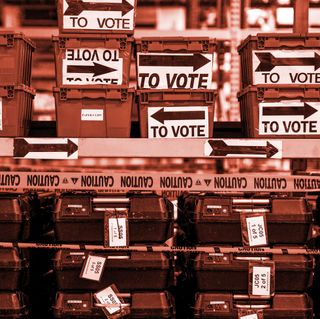
The day after the race, 700 voting machines in Fulton County,Georgia—where voting irregularities were reported—were sequestered and had yet to be recorded.
Reverend Abrams knew early on that her daughter would make a difference in the world and recounts a story of a 12-year-old Stacey as a Girl Scout when the family lived in Mississippi. “Stacey was the only black scout to represent her district. They went to Arizona for a national meeting. We took her to the airport to meet the group, and when we got there, the rest of the people had left and had not told us there was a change in plans. Stacey, who had never flown before, asked if she could go anyway. She found out there was another plane shortly that she could take. My husband and I were reluctant to let her go, but she was determined because she had won the right to represent. So Stacey flew across the country to a scout meeting that I believe had been conveniently arranged so that she would not be there. She made it to that meeting, and she represented Mississippi.”
Strength is admirable, but it can also make you seem impenetrable and unable to connect. Abrams manages, however, to be both erudite and endearing. Bettina Love and her family were Abrams’s neighbors in Atlanta’s Kirkwood neighborhood for almost four years, during which time Abrams would sometimes bring in their trash cans or give their children a civics lesson if they asked about government. Love tells me about a time when she ran into Abrams, who was by that time in need of a security detail because she was running for office. Abrams offered to babysit her children. “She never changed. She is a politician, but she doesn’t feel like a politician,” Love says. On another occasion, Love attended an Abrams event at a local barbershop. One man was “agitated about small businesses and what she was going to do to help. By the time she gave her answer, you could see his whole body ease,” Love recalls. “He was good with her answer, and his body wasn’t tense anymore.”
My responsibility is progress. I may not get the victory, but did I make gains?
That ability to neutralize and disarm her critics is one of Abrams’s superpowers. Abrams sees this skill in far more pragmatic terms. “I know what I believe and why I believe it. My job is to understand what you believe and why you believe it. If you do that with authenticity, you create space for conversation.”
“In most instances,” says Representative Carolyn Hugley, the House minority whip during Abrams’s tenure as minority leader, “Stacey is the smartest person in the room.” But in addition to this, Abrams “is the kind of person who is genuinely interested in everyone’s ideas.” That characterization of Abrams is one I heard over and over again from Abrams’s supporters and members of her team. Ann Wilson Cramer, one of Abrams’s mentors since her days at Spelman College, says similarly, “She is always that rare blend of the smartest person in the room but with a heart that respects the other.”
Smart women who know they’re smart and dare let other people know it too are often deeply unliked in American politics. Ask Hillary Clinton. Ask Elizabeth Warren. Wonkishness is not a selling point if you’re a woman. And charisma is usually seen as the province of men. Somehow, Abrams manages to be wonkish, bookish, nerdy, and “sturdy” (her adjective to describe being plus-size) and yet still be charming and beloved. Perhaps the soft southern drawl, a product of her Mississippi roots, makes her feel familiar and accessible. Perhaps it is because she is both tough and tender.
She’ll need to be all these things and more to keep people engaged after a hard-fought battle and a heartbreaking result. As Kimberlé Crenshaw, a professor at UCLA School of Law and Columbia Law School who has written about black feminist legal theory, racism, and the law, has argued, the problem is not just one of voter suppression but of “voter depression.” I asked Carol Anderson, Atlanta resident, historian, and author of One Person, No Vote, whether voter suppression would kill morale. She had heard strains of it in the aftermath of the election and so much effort: “We did all that, and she still didn’t win.”
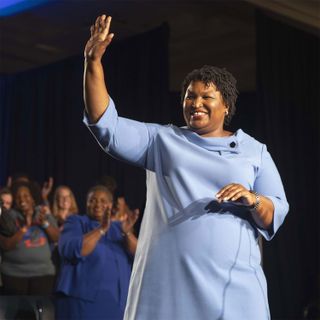
Abrams at her election-night party in Atlanta.
That Georgia is a 21st-century “ground zero” (as it was in the 20th century as one of the earliest Southern states to win the battle for black voting rights, in 1946) for the fight to secure voting rights brings to mind not only Abrams’s language of the asymptote but also Dr. Martin Luther King Jr.’s oft-quoted observation that “the arc of the moral universe is long, but it bends toward justice.” Long moral arcs and asymptotic trajectories make for poetic speeches, but they are cold comfort to voters who have high expectations of progressive politics in the present Trump moment. Still, Anderson, who spent Election Day driving seniors to the polls, feels optimistic about the fight ahead. “There was a deflation after the civil-rights movement,” she says. “That is because it got pitched as winning the Super Bowl and not just getting a first down. When you get a perspective about what the struggle is, that first down keeps you on the field fighting.” Marie Claire contributing editor Alicia Garza, a strategy and partnerships director of the National Domestic Workers Alliance, shares Anderson’s enthusiasm. Black women from eight different countries, all Georgia domestic workers, did outreach on behalf of the organization’s political-action arm, Care in Action, and were Abrams’s biggest canvassing team. “She really cared about the experiences of black domestic workers in Georgia,” Garza says. “She had a vision for how to improve their lives.”
Abrams’s team hopes the PAC arm of Fair Fight, which ran ads encouraging voters to sign up for the Affordable Care Act and to support fair elections, can also keep voters engaged. An added benefit of keeping her constituents informed about policy matters relevant to them is that she will remain on the minds of her supporters. “Part of the mission of Fair Fight and the reason we are connecting votes to issues is that we want people to remain animated,” Abrams says. “There will be some attrition. There will be people for whom this was their one attempt and the perfidy of the other side is so egregious as to tell them they shouldn’t try again. My mission is to make that the smallest cohort possible, and that’s why my speech on November 16 was so important to me. If I had said that what they did was right, then it reaffirms every cynicism that they have. By saying it was wrong, you create space for people to understand. If this is a game, you’re not going to let the ref come back. You’re not going to let the person who deflated the ball do it again. Let’s remind them not just about why they voted for me but why they voted at all.” In his response, Kemp did not acknowledge voter-suppression claims in her speech, saying Georgians were ready to move forward.
Abrams’s parents raised their children to believe they had responsibility—not to win, but to fight. And she has made clear that her fight includes running for office again. She recently joined the board of directors at liberal think tank the Center for American Progress and launched a thank-you tour through Georgia. She was chosen to issue the Democratic response to the State of the Union address in February. In it, she issued a vehement rebuke to the voter suppression that stymied her in Georgia: “The foundation of our moral leadership around the globe is free and fair elections, where voters pick their leaders, not where politicians pick their voters.” She also affirmed the importance of “reproductive justice,” a term invented by black feminist activists that centers on not just the right to abortion but also the right to good health care and advocacy at every stage of parenting. And she shouted out both unions and the domestic workers who had been so pivotal to her run for the governorship, signaling that if she were to run again, she would have policies to support the working class.
Her speech was so well-received—politicians and pundits from Joe Biden and Nancy Pelosi to former senior adviser to President Barack Obama Dan Pfeiffer and MSNBC’s Joy Reid showered praise—the calls for her to seek public office grew ever louder. She has not yet decided on whether she will run for governor, the Senate, or even the presidency. However, she has met with Senate minority leader Chuck Schumer (D-N.Y.) and chair of the Democratic Senatorial Campaign Committee Catherine Cortez Masto (D-Nev.) about a possible 2020 U.S. Senate run against Republican David Perdue. Her State of the Union response and her feat of nearly turning Georgia blue has opened a wide field of possibilities for her. And of a possible 2022 rematch for Georgia governor, she says, “Next time, I’m gonna take it if that’s what I run for. But the next thing I go for, I’ve gotten closer [to Georgia governor] than anyone else, and there’s a joy in that.”
This article originally appeared in the April 2019 issue of Marie Claire.
RELATED STORY

-
 Taylor Swift Endorses Ryan Gosling and Emily Blunt's "All Too Well" Parody From 'SNL'
Taylor Swift Endorses Ryan Gosling and Emily Blunt's "All Too Well" Parody From 'SNL'She loves it.
By Iris Goldsztajn Published
-
 Shakira Makes Surprise Coachella Appearance and a Big Announcement
Shakira Makes Surprise Coachella Appearance and a Big AnnouncementThe iconic singer also performed two songs for the crowd.
By Danielle Campoamor Published
-
 Prince Harry Says Africa Is "In His Soul"
Prince Harry Says Africa Is "In His Soul"The Duke of Sussex took Meghan Markle to Botswana for the couple's third official date.
By Danielle Campoamor Published
-
 36 Ways Women Still Aren't Equal to Men
36 Ways Women Still Aren't Equal to MenIt's just one of the many ways women still aren't equal to men.
By Brooke Knappenberger Last updated
-
 How New York's First Female Governor Plans to Fight for Women If Reelected
How New York's First Female Governor Plans to Fight for Women If ReelectedKathy Hochul twice came to power because men resigned amid sexual harassment scandals. Here, how she's leading differently.
By Emily Tisch Sussman Last updated
-
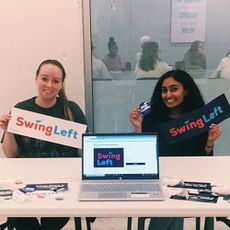 Why the 2022 Midterm Elections Are So Critical
Why the 2022 Midterm Elections Are So CriticalAs we blaze through a highly charged midterm election season, Swing Left Executive Director Yasmin Radjy highlights rising stars who are fighting for women’s rights.
By Tanya Benedicto Klich Published
-
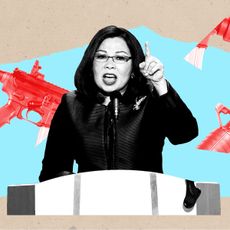 Tammy Duckworth: 'I’m Mad as Hell' About the Lack of Federal Action on Gun Safety
Tammy Duckworth: 'I’m Mad as Hell' About the Lack of Federal Action on Gun SafetyThe Illinois Senator won't let the memory of the Highland Park shooting just fade away.
By Sen. Tammy Duckworth Published
-
 Roe Is Gone. We Have to Keep Fighting.
Roe Is Gone. We Have to Keep Fighting.Democracy always offers a path forward even when we feel thrust into the past.
By Beth Silvers and Sarah Stewart Holland, hosts of Pantsuit Politics Podcast Published
-
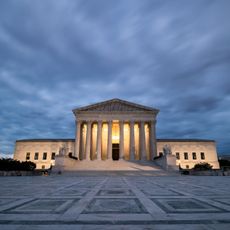 The Supreme Court's Mississippi Abortion Rights Case: What to Know
The Supreme Court's Mississippi Abortion Rights Case: What to KnowThe case could threaten Roe v. Wade.
By Megan DiTrolio Published
-
 Sex Trafficking Victims Are Being Punished. A New Law Could Change That.
Sex Trafficking Victims Are Being Punished. A New Law Could Change That.Victims of sexual abuse are quietly criminalized. Sara's Law protects kids that fight back.
By Dr. Devin J. Buckley and Erin Regan Published
-
 My Family and I Live in Navajo Nation. We Don't Have Access to Clean Running Water
My Family and I Live in Navajo Nation. We Don't Have Access to Clean Running Water"They say that the United States is one of the wealthiest countries in the world. Why are citizens still living with no access to clean water?"
By Amanda L. As Told To Rachel Epstein Published